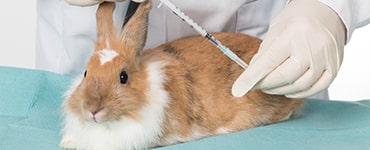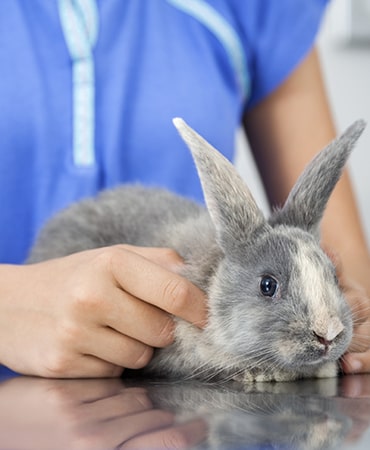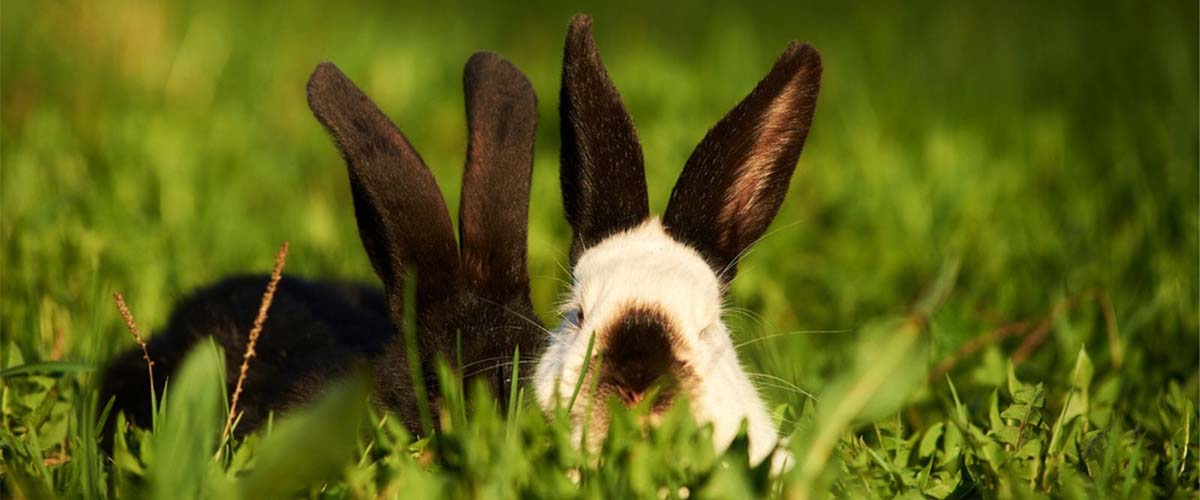Rabbit Haemorrhagic Disease (RHD)
Overview
- Rabbit Viral Haemorrhagic Disease (also known as RVHD, RHD and VHD), is a nasty virus that targets rabbits, attacks internal organs and causes internal bleeding.
- Sadly, RHD is fatal in most cases.
- RHD spreads via rabbit to rabbit contact (often wild rabbits), in the air and also via insect bites.
- There are two types of RHD virus: RHD1 and RHD2.
- Vaccinate your rabbits against both RHD1 and RHD2 to protect them fully.
What is RHD?
RHD is a virus that targets rabbits, attacks their internal organs (such as the liver), and causes internal bleeding. Sadly, RHD is fatal in most cases.
There are two types of RHD virus, RHD1 & 2. RHD1 causes very sudden illness and is nearly always fatal within two days of catching it. RHD2 often develops a bit more slowly and is often fatal within 1-2 weeks. Rabbits with RHD2 are much more likely to spread the disease because they live for longer with symptoms.

Vaccination is the best way to protect your rabbits against RHD.
Symptoms
Symptoms of RHD often include:
- Blood around the nose, mouth or bottom
- Low energy (lethargy)
- Eating less - which can cause serious problems and even be fatal in rabbits
- High temperature
- Sudden death - RHD often develops so quickly that infected rabbits die before their owner notices any symptoms.
When to contact your vet
Book an urgent appointment with your vet if your rabbit has any of the symptoms listed above, especially if they have stopped eating. You know your rabbit best. If they don’t have the symptoms listed above but you are still concerned, it’s always best to contact your vet.
Treatment and outlook
Sadly, there is no cure for either RHD1 or RHD2 and the chances of survival are slim. If symptoms are severe, euthanasia (putting to sleep) is often the kindest option.
After infection
If you have lost one of your rabbits due to RHD, their enclosure and all other items should be thrown away. RHD can survive in the environment (on bowls, water bottles, walls, grass etc.) for months, so you must seek advice from your vet about how to disinfect properly. Only fully vaccinated rabbits should be allowed into their area in the future.
If you own a rabbit that has survived RHD, or who’s partner rabbit has passed away due to the virus, you should get them and any new rabbits up to date with their vaccines and wait at least three weeks before introducing them to each other.
Preventing RHD
Vaccination
- Fortunately, we can vaccinate our rabbits against RHD1 and RHD2 (as well as myxomatosis) – read more about rabbit vaccinations on our website.
Prevent insect bites
- Avoid attracting insects by keeping your rabbits and their living environment clean. This will also reduce the risk of flystrike.
- Cover your rabbit’s living space with mosquito netting if necessary.
- Speak to your vet for advice on the best flea protection for your rabbits.
- Fleas from cats and fleas from dogs can spread RHD, so make sure all your animals are regularly treated for fleas.
Prevent contact with wild rabbits
- Keep your pet rabbits away from wild rabbits by rabbit proofing your garden or double fencing their living space.
Quarantine new rabbits
- Any new rabbits should be vaccinated and kept away from your existing rabbits for at least three weeks.

Get your rabbit vaccinated and keep on top of boosters.
Published: April 2020
Did you find this page useful?
Tell us more
Please note, our vets and nurses are unable to respond to questions via this form. If you are concerned about your pet’s health, please contact your vet directly.
Thank you for your feedback
Want to hear more about PDSA and get pet care tips from our vet experts?
Sign up to our e-newsletter
Written by vets and vet nurses. This advice is for UK pets only. Illustrations by Samantha Elmhurst.

